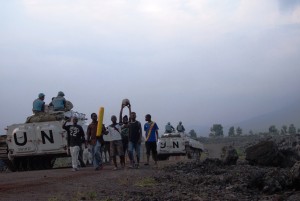Tens of thousands Congolese to be forced from their homes, UN warns
 As one of the world’s most resource-rich countries, the Democratic Republic of the Congo seems to have succumbed to the infamous resource curse that plagues most developing nations. Ever since the DRC gained its independence in 1960, the country’s abundance in natural resources has come with greed and conflict. The city of Goma alone is incredibly rich in cobalt, copper, diamonds, and gold, while the other regions boast of an abundance of these same minerals as well as silver, zinc, manganese, tin, uranium, and coal--all of which are essential to the development of modern technology and any modern economy.
As one of the world’s most resource-rich countries, the Democratic Republic of the Congo seems to have succumbed to the infamous resource curse that plagues most developing nations. Ever since the DRC gained its independence in 1960, the country’s abundance in natural resources has come with greed and conflict. The city of Goma alone is incredibly rich in cobalt, copper, diamonds, and gold, while the other regions boast of an abundance of these same minerals as well as silver, zinc, manganese, tin, uranium, and coal--all of which are essential to the development of modern technology and any modern economy.
Today, the DRC once again finds itself amidst a conflict that has its roots in the country’s rich natural reserves and the ever-present greedy players that seek to gain access to them. Several groups have taken part in this more recent conflict which stems from the Congo War of 1998, which broke out after Rwanda tried to remove Mobutu Sese Sekou’s successor, Kabila, from power, later entangling several surrounding nations in the conflict. Although this conflict officially ended with peace talks in South Africa in 2002, many of the 200+ ethnic groups in the country felt that the central government was not delivering the level of freedom that they expected. But perhaps more importantly, there was and continues to be a growing sentiment that the central government is corrupt, and limits access to the country’s lucrative national resources to a few elite.
Today, among these fighting groups are the Tutsi militia group from Rwanda, UN peacekeeping forces, the Congolese military and M23. Being the main insurgent group, many members of M23 seem to have formerly been a part of the Congolese Army, but eventually started turning against the government after the peace talks in South Africa in 2002 in an effort to “liberate” the Congo by granting more freedoms to the Congolese, and by granting all Congolese citizens equal and fair access to the nation’s immense natural reserves. However, because of just how much profit there is to be made in this ‘liberation’ and control of the Congo, many Congolese have personally questioned the true intentions of all the parties involved.
More recently, based on UN Reports, there seems to be enough evidence to suggest that camps harboring more than 50,000 displaced people in the eastern part of the country have been torched, and thousands more were displaced by continuous fighting. This evidence has prompted the UN to put out a warning against having troops from the United Nations Organization Stabilization Mission in the DRC (MONUSCO) exit the region too soon, considering how thousands could be at risk of being displaced due to the violence. Having UN troops pull out at a time like this could be catastrophic, especially for the 250,000--and over-- displaced people in the eastern region who are already in need of aid.
Despite a ceasefire agreement with the Congolese government and the UN in January 2014, M23 rebel leader Laurent Nkunda resumed fighting in August, forcing more than 200,000 people out of their homes in the process. This has led to a situation where even the thousands of people who have been displaced in the past couple of months cannot be reached by relief groups to receive food, shelter and support; it has become entirely too dangerous for aid workers to even venture into displacement camps in Goma due to the incessant fighting between the M23, and the MONUSCO-backed Congolese army.
Juliette Prodham, the head of Oxfam in the DRC, an organization that provides short-term emergency relief and long-term development assistance in the region, said on October 2008: “All international staff has been evacuated from the region as a precautionary measure.” Similarly, groups like “Save the Children” have begun to evacuate their staff from the province of North Kivu due to the fighting. This has left the increasing number of people in far greater need of assistance, which will increasingly become less and less available to them. Nonetheless, the UN believes that despite the staggering toll of internally displaced persons, the worst is yet to come, especially if the MONUSCO troops exit the country this early. This warning against MONUSCO’s exit is one of great desperation.
